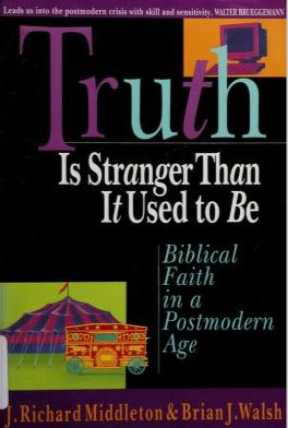Over the past decade, a number of people have commented that the book Brian Walsh and I wrote addressing the postmodern situation, Truth Is Stranger Than It Used to Be: Biblical Faith in a Postmodern Age (IVP, 1995), seemed to be written for our twenty-first century context since it spoke directly to issues current in Western (and especially, North American) culture. (As a person from the Majority World, I would say that these issues are actually global.)

One of the comments about the book’s relevance came from Chris Stratton, the editor of an online journal for United Methodist pastors and theological students called Catalyst. Chris had recently reread the book and wondered if I would write an online article reflecting on the analysis from nearly thirty years ago, exploring its significance for our contemporary situation of tribalism and toxic polarization. He suggested the title “Our Postmodern Moment.”
Chris originally asked me in 2021, but I was too busy with other writing projects and deferred the article until Spring 2023. I say “article,” but it turned out that I needed to write three articles! Or, more accurately, a three-part article.
I retained Chris’s suggestion of “Our Postmodern Moment” as the overall title and gave the three parts descriptive subtitles. PDFs of each part may be downloaded below (the original links to Catalyst are no longer active).
1. Our Postmodern Moment, Part 1: Diagnosing the Problem
Part 1 revisits the analysis of the postmodern condition that Brian Walsh and I proposed, while fleshing it out in line with how I have been teaching these matters over the years (as part of graduate and undergraduate courses on a Christian worldview).
2. Our Postmodern Moment, Part 2: The Biblical Metanarrative
Part 2 explores some of the resources of Scripture for our current context in terms of how God relates to human subjectivity, agency, and disorientation (drawing on cues I have noticed in the biblical narrative through from my research and teaching over the years).
3. Our Postmodern Moment, Part 3: Christian Discipleship in a Polarized World
Part 3 was the most difficult to write, since I wanted to give practical guidance on how to live out the Christian faith in a toxic culture, which has often infiltrated the church. It is especially addressed to pastors and other church leaders.
Three Umpires
In Part 1 of the article I retell the story (quoted in Truth Is Stranger than It Used to Be) about three umpires explaining how they judge baseball games.
Three umpires were having a beer after a baseball game. One said: “There’s balls and there’s strikes and I call ’em the way they are.” The next umpire replied: “There’s balls and there’s strikes and I call ’em the way I see ’em.” The third umpire said: “There’s balls and there’s strikes and they ain’t nothin’ until I call ’em.”
This story, originally meant to be a joke, quite seriously illustrates different approaches to “truth” in our world today; it is particularly relevant to our so-called “post-truth” culture.
Parts 2 and 3 of the article return to this story to clarify the paradox of how Christians can legitimately claim a normative position (the truth is out there), while recognizing our ineradicably subjectivity (we only approach the truth through our perspectives). This paradox has implications both for how we read the Bible and for we relate to our neighbors with whom we may disagree radically.
I would be very interested in hearing responses from readers.


